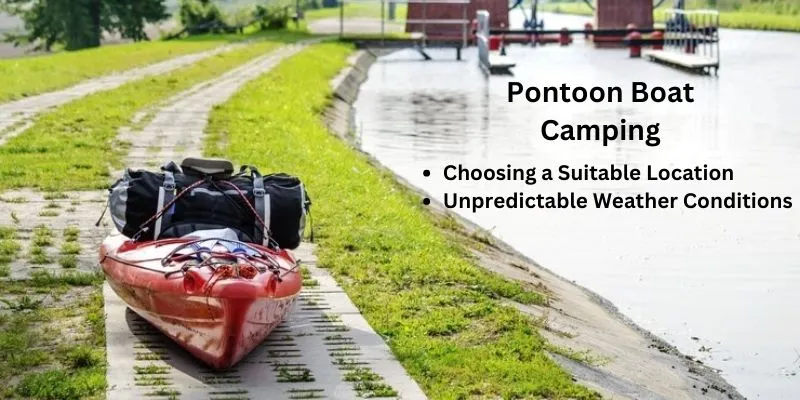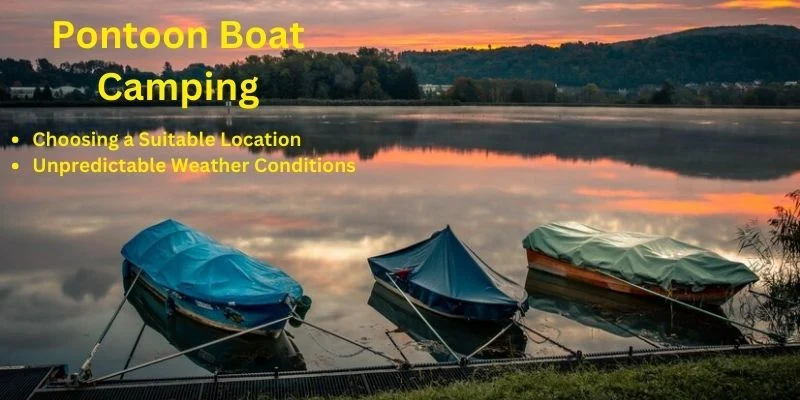Experience the Thrill of Pontoon Boat Camping: 9 Expert Strategies
Updated: 3 Apr 2024
179
If you have a passion for the open waters and the great outdoors, pontoon boat camping could be your next epic adventure. Imagine waking up to the gentle lapping of waves, surrounded by the tranquility of nature under a star-speckled sky. It’s an experience that combines the relaxation of sailing with the rugged charm of camping.
This comprehensive guide will show you how to transform your standard pontoon boat into an overnight haven and ensure your floating campsite is memorable and respectful of the environment. Whether you’re new to pontoon camping or a seasoned boater seeking fresh insights, this post is your compass to a successful waterborne adventure.
Getting Started with Pontoon Boat Camping
The key to a successful pontoon boat camping trip lies in preparation. Before you cast off, you’ll need to assemble the right gear. Here’s a starter list:
Essential Equipment and Supplies
- Safety gear includes life jackets, a first-aid kit, emergency flares, and a fire extinguisher.
- Shore power adapter and generator for electricity needs.
- Navigational tools, binoculars, and a marine GPS.
- Anchoring system appropriate for your location.
- Cooking equipment – think compact stoves and freeze-dried meals.
- Sleeping gear – a high-quality sleeping bag, an insulating sleeping pad, and a tent designed for overwater camping.
- You’ll also need a fresh water supply with filtration and purification.
- Multi-tool kits and repair materials for on-the-go solutions.

Tips for Selecting Your Pontoon Boat
Choosing the right pontoon boat for camping is crucial. Look for one with ample deck space and storage for your gear. A vessel that offers a stable, smooth ride will also make your camping expeditions more enjoyable.
Planning Your Pontoon Boat Adventure
Planning can make the difference between a good trip and a great one. Here are some things to consider:
1. Choosing a Suitable Location
Pick a spot with calm, sheltered waters and plenty of space for your campsite. National parks and wildlife refuges often have designated areas for overnight mooring—their natural beauty and protected status attract low-impact campers.
2. Unpredictable Weather Conditions
Always check the weather forecast and be prepared for any eventuality. Water-related activities can be affected by high winds or storms. It’s best to be equipped with durable, waterproof clothing and gear.
Safety Considerations for Pontoon Boat Campers
Pontoon boat camping offers a unique adventure, but safety should always be your top priority. Here are some key considerations to ensure a smooth and safe trip:
Before You Go
- Boat worthiness: Have your pontoon boat inspected by a qualified mechanic to ensure it’s in good working order. Check the engine, electrical systems, and bilge pump.
- Life Jackets: Ensure everyone on board has a properly sized and functional life jacket. Consider bringing extra ones for unexpected guests.
- Permits and Regulations: Research the regulations of the waterway you’ll be camping on. Obtain any necessary permits for overnight camping, fishing, or fires.
- Weather Awareness: Closely monitor weather forecasts before and during your trip. Be prepared to adjust your plans or seek shelter if storms approach.
- Trip Plan: Inform a friend or family member about your trip itinerary, including your intended route, camping location, and estimated return time.
- Navigation: Have a map of the waterway and a compass onboard. Consider a GPS device as a backup navigation tool.
On the Water
- Safe Operation: Always operate the boat at safe speeds and follow boating rules. Be aware of other boaters, swimmers, and obstacles.
- Anchoring Securely: When anchoring for camping, use a strong anchor appropriate for your boat size and water conditions. Double-check your anchor is set securely before settling in for the night.
- Night Visibility: If traveling at night, ensure your boat has proper navigation lights to be visible to other vessels.
- Fire Safety: Follow all fire regulations for the area. Use designated fire pits or grills and extinguish them properly before leaving your campsite.
- Carbon Monoxide (CO) Detectors: Install battery-powered CO detectors onboard your pontoon boat, especially if you plan to use any generators or fuel-powered appliances.
- Communication: Carry a VHF radio or marine satellite communicator for emergencies. Cell phone service may be unreliable on the water.
Additional Tips
- First-Aid Kit: Pack a well-stocked first-aid kit with essential supplies for treating minor injuries.
- Sun Protection: Don’t forget sunscreen, hats, and sunglasses to protect yourself from the sun’s harmful rays.
- Emergency Supplies: Pack a basic emergency kit with items like a flashlight, extra batteries, flares, and a whistle.
- Leave No Trace: Respect the environment by practicing responsible camping principles. Pack out all your trash and leave the campsite as you found it.
By following these safety considerations, you can ensure your pontoon boat camping trip is a fun and unforgettable experience for everyone involved.
Pontoon Boat Camping Activities
With the safety measures, it’s time to enjoy the experience fully.
1. Fishing
Pontoon boats are ideal for fishing thanks to their spacious decks and stability. You can cast a line from your anchored boat or troll for fish as you cruise around the lake.
2. Swimming and sunbathing
The best part about being on a lake is being able to enjoy the water. Pontoon boats typically have areas where you can lay out and soak up the sun or cool off with a swim.
3. Watersports
Many pontoon boats are large enough to tow tubes, kneeboards, or wakeboards. This is a great way to get some exercise and have some fun on the water.
4. Grilling
Pontoon boats often have space for a portable grill, which is perfect for cooking up burgers, hot dogs, or fresh fish.
5. Wildlife watching
Lakes and rivers are home to all sorts of wildlife, such as birds, fish, turtles, and otters. Keep your eyes peeled as you explore to see what you can spot.
6. Stargazing
Because you’ll be away from light pollution on land, you’ll be able to see incredible star displays at night.

7. Reading and relaxing
The gentle rocking of the boat and the sounds of nature can be very relaxing. Bring a good book or magazine and enjoy some quiet time on the water.
8. Exploring hidden coves
Pontoon boats can navigate shallow waters that other boats can’t. This allows you to explore hidden coves and inlets that most people don’t get to see.
By planning some fun activities, you can make your pontoon boat camping trip even more enjoyable
Essential Information for Pontoon Boat Camping
Setting off on a pontoon boat camping trip is a special way to enjoy both peace and excitement in the great outdoors. But for it to be fun, it’s important to know what you need. Here, we’ve put together important stuff to know for pontoon boat camping, like how big the boat should be and what gear to bring:
| Aspect | Details |
| Boat Size | Varies (typically 18-30 feet in length) |
| Accommodation | Typically sleeps 4-8 people |
| Amenities | Kitchenette, sleeping quarters, toilet |
| Safety Measures | Life jackets, fire extinguisher, first aid kit |
| Navigation Equipment | GPS, compass, navigation lights |
| Storage Space | Limited, pack efficiently |
| Fuel Capacity | Varies by boat size, typically 20-50 gallons |
| Activities | Fishing, swimming, hiking, wildlife watching |
| Regulations | Follow local boating and camping regulations |
| Recommended Gear | Tent, sleeping bags, cooking supplies, insect repellent |
| Booking | Check availability in advance, reserve camping spots if needed |
| Maintenance | Regular cleaning, engine checks, safety inspections |
| Environmental Impact | Dispose of waste properly, avoid disturbing wildlife |
| Cost | Varies by location and duration of rental |
| Tips | Plan for weather changes, bring enough supplies, inform someone of your itinerary |
Sustainable Practices in Pontoon Boat Camping
Camping on the water comes with its own set of environmental responsibilities.
1. Leave No Trace on the Water and Land
The Leave No Trace Center for Outdoor Ethics offers seven principles for all outdoors enthusiasts. When camping via pontoon boat, these include oaring in places with minimal foot traffic, camping on established campgrounds, minimizing campfire impacts, observing wildlife from a distance, and avoiding isolated skeletons.
2. Waste Management
Disposing of waste responsibly is crucial. Use on-board facilities when available, and if not, invest in portable toilets and waste disposal bags. Always pack out all trash and waste to keep the waters pristine for others.
Important Note
As you plan your next pontoon boat camping trip, remember that the best adventures are those that respect the environment and provide opportunities to learn and appreciate nature. By following the steps outlined in this guide, you can be assured that your pontoon boat camping experience will be one for the books, allowing you to create lasting memories while leaving the waterways as undisturbed as you found them.
Pros and Cons of pontoon boat camping
| Pros |
|---|
|
| Cons |
|---|
|
FAQs
Is pontoon boat camping a good idea?
Pontoon boat camping is fantastic! It allows you to explore hidden coves, relax on spacious decks, and enjoy activities like fishing and swimming right from your campsite.
What are the benefits of pontoon boat camping?
Pontoon boat camping offers unique access to secluded areas, expansive decks for lounging under the stars, and the chance to combine your camping trip with water activities.
What are the challenges of pontoon boat camping?
Compared to traditional camping, space for amenities is limited on pontoon boats. You’ll also be more susceptible to weather changes and need to prioritize safety with proper anchoring, life jackets, and following boating regulations. Be prepared to pack efficiently as storage space is smaller than car camping.
What should I consider before going pontoon boat camping?
Before you head out, choose a boat big enough for your group and gear. Research any permits or regulations required for your chosen waterway. Pack essential safety items like life jackets and a first-aid kit. Since space is limited, plan meals and activities accordingly.
Is pontoon boat camping safe?
Pontoon boat camping can be absolutely safe with proper preparation. Ensure your boat is in good working order, familiarize yourself with boating safety rules, and stay informed about weather conditions.
Conclusion
Pontoon boat camping offers a unique blend of adventure, relaxation, and closeness to nature. By following the guidelines above, you can ensure that your pontoon boat camping trips are enjoyable, safe, and environmentally friendly.
In an age where sustainable travel has never been more critical, pontoon boat camping stands out as an example of enjoying the outdoors with a smaller ecological footprint. Share your pontoon boat camping experiences with friends and family, and inspire others to take the plunge into this extraordinary way of outdoor living.
Ready to set your sails? Gather your gear and chart your course. The world of pontoon boat camping awaits! Subscribe to our blog for more adventure tips and stories, and share your pontoon boat camping highlights with us. We wish you fair winds and smooth seas as you venture outdoors.
Please Write Your Comments